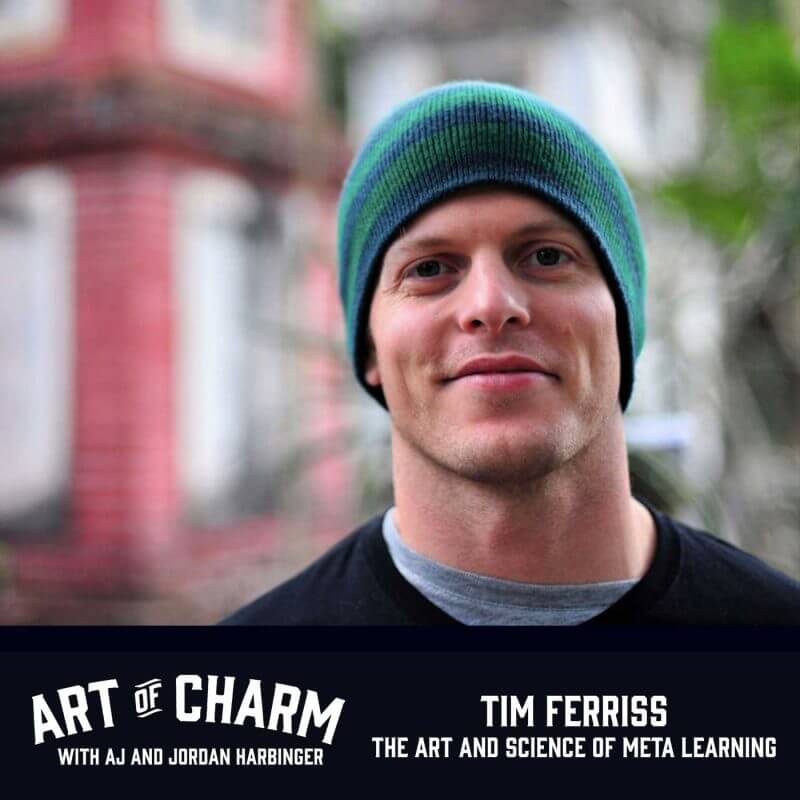Learn from someone who is great at something they shouldn’t be great at.
“You don’t need to be superhuman to get superhuman results.” -Tim Ferriss
The Cheat Sheet:
- The two language hacks Tim recommends.
- What’s the exercise he’d do if he could do only one for the rest of his life?
- His recommendations for how and why to fast.
- What is fear setting and how can you apply it to your life?
- What are saccadic movements?
- And so much more…
Subscribe to The Art of Charm Podcast:
[aoc-subscribe]
Tim Ferriss is a man known around the globe for experimenting and discovering the best, fastest, and most effective ways of learning. Whether it’s spending a week to learn to play drums for Foreigner live in concert or speaking Tagalong fluently during a Filipino interview, Tim has done it.
On today’s episode we talk about meta-learning for language and other skills, what happened to his TV show, and his unique take on goals and risk. Listen in for all of this and more on this bonus edition of The Art of Charm.
Click here to support the show and check out HostGator!
More About This Show:
If you’ve followed Tim Ferriss for any length of time, you know he’s man of experimentation and meta-learning. In fact, the title of his blog is Experiments in Lifestyle Design, which is completely appropriate for what he shares with the world.
On today’s episode, Tim and I talk about language hacks (and how they apply to other areas of life), the details of his current fasting regimen, the status of his TV show, his views on goal setting, risk, and what he wishes every single adult would do at least once in their lifetime.
When it comes to goal setting, Tim uses an approach he calls fear setting. He does this at least every eight weeks, and any time he feels overwhelmed or anxious about a decision he has to make. And his process, of course, is quite simple.
First he takes a physical piece of paper, lays it down landscape style, and then he creates three columns. In the column on the far left he makes a list of every possible thing that could go wrong if he does whatever he’s considering doing. He is very specific and writes down every single thing he can think of.
In the middle column he writes down everything he can do to mitigate the items in the far left column. And then in the last column he makes a list of everything he can do to get back to where he is right now if all the breakdowns from the far left column actually happen.
With that information he makes an informed and calculated decision that minimizes his risk, because as he puts it, risk is “an irreversible negative outcome.”
Continuing from there we also discuss two of his favorite skills he’s learned: swimming and speed reading. He once thought learning to swim was an impossible thing for him because he was into his thirties before he tried it. Once he had conquered the skill, he began to ask himself: “What else have I assumed is impossible?”
The other skill we discuss is speed reading. Tim also gives us a tip to double our reading speed and increase comprehension at the same time. As you might expect, it’s a super simple trick that you can do as soon as you listen.
Tune in for this and then join me in thanking Tim for sharing his masterful meta-learning techniques on today’s episode. We’ll see you next time on The Art of Charm!
THANKS, TIM FERRISS!
If you enjoyed this session of The Art of Charm podcast, let Tim know by clicking on the link below and sending him a quick shout out on Twitter:
Click here to thank Tim on Twitter!
Resources from this episode:
- Tim Ferriss’ blog
- Tim on Twitter
- Inulin: why and how Tim uses it
- Baobab
- Tim Ferriss horseback archery video
- The Tim Ferriss Experiment: bonus footage
- The Tim Ferriss Experiment on iTunes
Sponsored By:
You’ll Also Like:
- The Art of Charm Challenge (click here or text AOC to 38470 in the US)
- The Art of Charm Bootcamps
- Elite Human Dynamics
- Best of The Art of Charm Podcast
- The Art of Charm Toolbox
- The Art of Charm Toolbox for Women
- Find out more about the team who makes The Art of Charm podcast here!
On your phone? Click here to write us a well-deserved iTunes review and help us outrank the riffraff!





